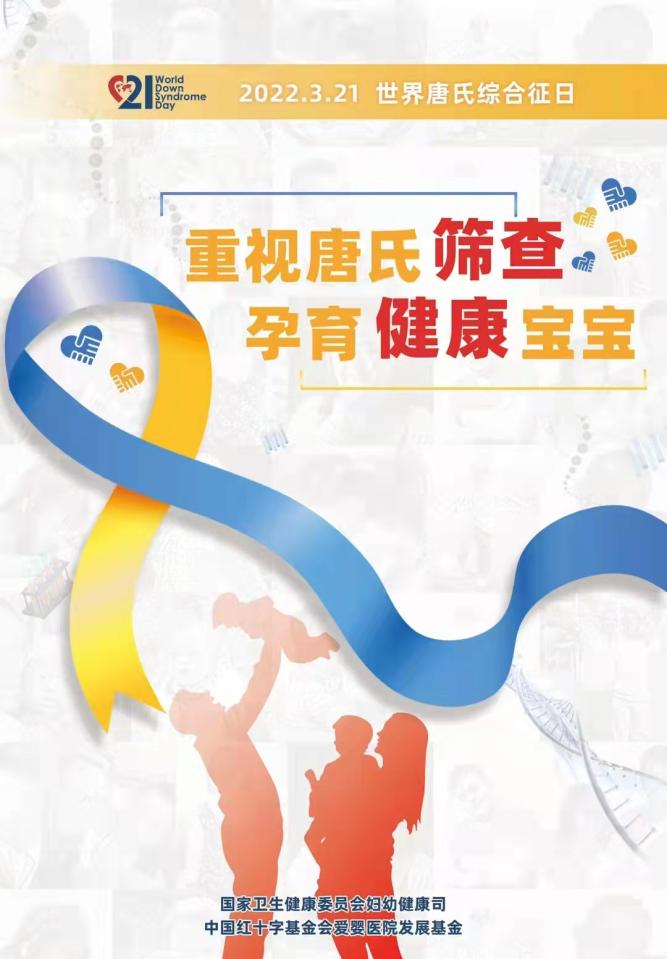March 21, 2022 is the 11th World Down Syndrome Day, and this year's theme is: Valuing Down Screening for Healthy Babies.

Since 2011, the United Nations General Assembly has designated March 21 as "World Down Syndrome Day" and regularly invites member states and other non-governmental organizations to hold activities aimed at raising awareness of Down syndrome in the whole society and calling for more forces to join in the care and relief of Down's children. As a country with a large birth population, governments at all levels, medical institutions and social groups at all levels attach great importance to and actively participate in the prevention and treatment of Down syndrome.
What is Down syndrome? Down syndrome, also known as congenital stupidity, is now commonly known as trisomy 21, and is one of the most common causes of severe birth defects, and there is no cure. That is, the 21st pair of chromosomes has one more (Trisomy 21), that is, there are 47 chromosomes in the cell, accounting for more than 90% of patients with Down syndrome. The incidence of the disease also increases with maternal age. Its sporadicity accounts for about 95%, hereditary is only 1%, and chimeric type is rare.
Clinical features of Down syndrome include congenital intellectual disability, special facial features, severe congenital malformations, moderate to severe mental illness, physical development, and learning disabilities. And the vast majority of patients have severe intellectual disabilities and are accompanied by a variety of organ abnormalities, such as congenital heart disease, leukemia, digestive tract malformations, etc.
What are the screening methods for Down syndrome?
Fetal ultrasound cervical clear layer screening (NT screening): in general, the more pronounced the thickening of NT in the first trimester, the greater the likelihood of fetal abnormalities.
Serological screening: the serum of pregnant women is drawn in the first and second trimesters, the concentration of alpha-fetoprotein (AFP) and chorionic gonadotropin (β-hCG) is detected, and the risk of giving birth to Down's child is comprehensively assessed by combining factors such as maternal age, weight, and gestational age.
Fetal free DNA prenatal detection (NIPT) in pregnant women's peripheral blood: By collecting pregnant women's venous blood, extracting DNA, using high-throughput sequencing technology to sequence free DNA fragments (including fetal free DNA) in maternal peripheral blood, and bioinformatic analysis of the results to assess the risk of common fetal chromosomal aneuploidy.
With the continuous improvement of the penetration rate and technology of Down's screening, and the care and help of all sectors of society for Down's children's families, the incidence of Down syndrome will be greatly reduced. Attach importance to the prevention and treatment of birth defects, effectively empower the three-level prevention, actively call on every family to have the awareness of active prevention and intervention of Down syndrome, call on the public to give more care and help to Down's children and their families, and believe that with the joint efforts of everyone, every family and every mother can enjoy happiness! 【Popular Science】
bibliography:
1. Luo Huiyuan, et al., Human Genetics, 2015; p44;
2. Article image source: Luo Huiyuan, et al., Human Genetics, 2015, P46.
About the Author
The author of this article is Ji Yingli, chief physician of the Genetic Center of Weinan Maternal and Child Health Hospital, chief physician of obstetrics and gynecology, senior nutritionist, senior nursery teacher, and yoga instructor. Graduated from Xi'an Jiaotong University School of Medicine, majoring in clinical medicine, he has been engaged in clinical work in obstetrics and gynecology for 25 years, and has studied in the Ninth Hospital of Peking University, with rich clinical experience. At present, he is working in the Department of Medical Genetics, engaged in eugenic genetic counseling, nutrition during pregnancy, prenatal diagnosis, and exercise teaching during pregnancy. He is skilled in perinatal health care, nutrition, multiple pregnancy complications, and complicated caesarean sections.
Click Share
Click Favorites
Thumbs up